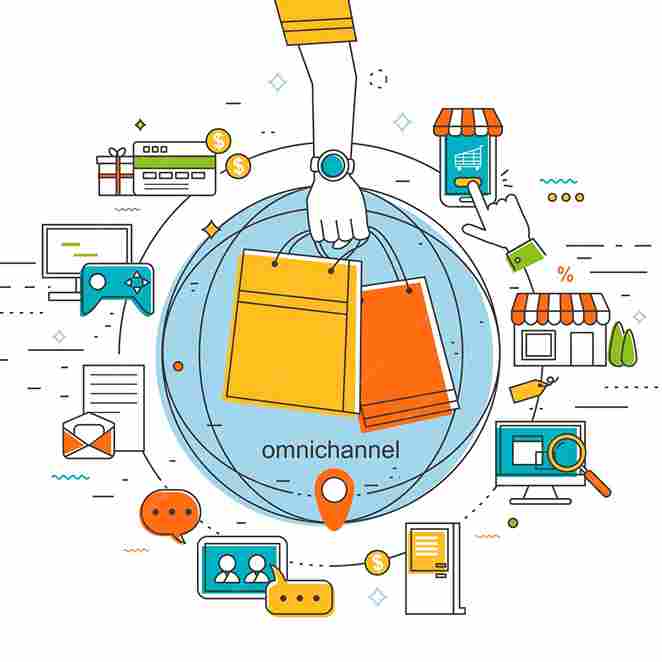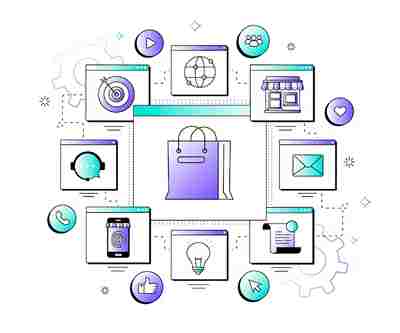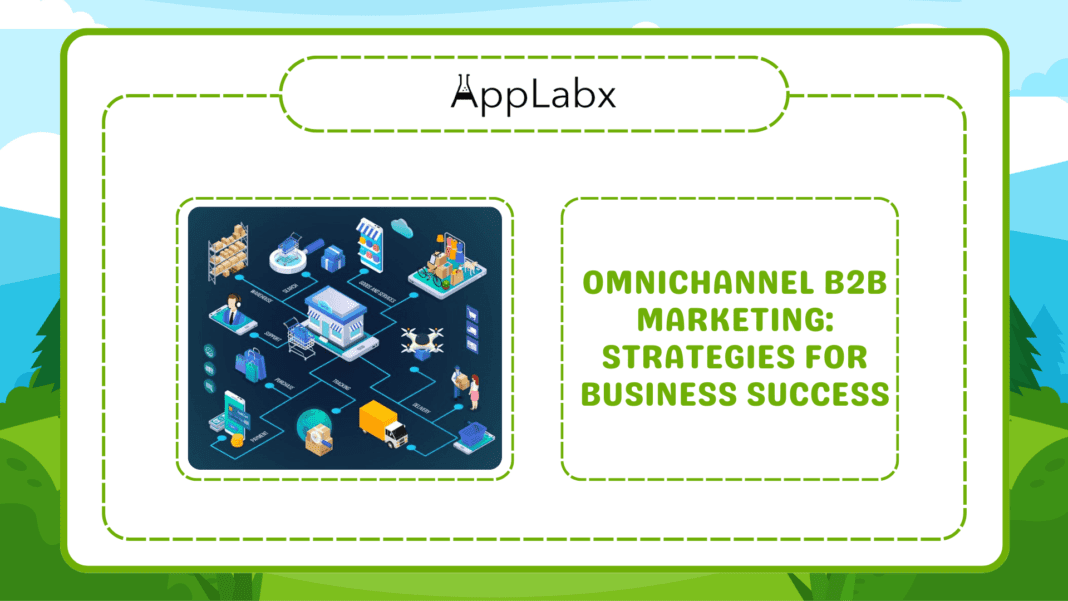Key Takeaways
- Unified Customer Experience Matters: Elevate your B2B brand by ensuring a consistent and seamless experience across all channels, fostering trust, and building lasting client relationships.
- Data-Driven Personalization is Key: Harness the power of customer insights for tailored content and targeted campaigns, enhancing satisfaction and driving success in the competitive B2B landscape.
- Adapt to Future Trends: Stay ahead by embracing emerging technologies like AI, optimizing for voice search, and continuously adapting strategies. Future-proof your B2B marketing for sustained business excellence.
In the ever-evolving landscape of B2B marketing, staying ahead of the curve is not just a competitive advantage; it’s a necessity for sustainable business success.
As we navigate through an era dominated by digital transformations and changing consumer behaviors, the need for a comprehensive marketing approach becomes increasingly apparent.
This brings us to the focal point of our exploration – “Omnichannel B2B Marketing: Strategies for Business Success.”
The term “omnichannel” has become a buzzword in the marketing realm and for a good reason.
It encapsulates a paradigm shift in the way businesses connect with their audience, emphasizing a seamless and integrated experience across various touchpoints.
In the B2B arena, where relationships and trust are paramount, adopting an omnichannel approach can redefine the dynamics of engagement and elevate your brand to new heights.

Navigating the Omnichannel Landscape
Before we dive into the strategies that underpin successful omnichannel B2B marketing, let’s establish a shared understanding of what this approach entails.
Omnichannel marketing transcends the confines of individual channels, weaving a cohesive narrative that spans online and offline interactions.
It’s not just about being present on diverse platforms but ensuring a consistent and personalized experience for your audience, irrespective of where they choose to engage.
In essence, omnichannel B2B marketing seeks to break down silos, allowing businesses to forge meaningful connections by meeting their clients where they are.
Whether it’s through social media, email, mobile apps, or face-to-face interactions, the goal is to create a unified brand experience that resonates with the intricate needs of B2B buyers.
The Significance in the B2B Sphere
Why is omnichannel B2B marketing more than just a trend?
The B2B buying journey is inherently complex, often involving multiple decision-makers, intricate procurement processes, and a more protracted sales cycle.
Unlike B2C transactions, where the end consumer may make a purchase based on emotion, B2B decisions are grounded in logic, research, and the perceived value of a solution.
Omnichannel strategies become a linchpin in navigating this complexity, providing a roadmap for businesses to engage with their audience at every stage of the buyer’s journey.
From awareness and consideration to the decision-making phase and post-purchase support, an omnichannel approach ensures a consistent flow of communication and information, nurturing leads and building enduring client relationships.
The Changing Dynamics of B2B Marketing
As we delve into the strategies for business success in omnichannel B2B marketing, it’s crucial to recognize the shifting dynamics that have spurred the need for this holistic approach.
Traditional B2B marketing models, reliant on linear communication and one-dimensional touchpoints, are giving way to a more dynamic, interconnected ecosystem.
The digital age has empowered B2B buyers with an abundance of information, enabling them to conduct extensive research before even engaging with a sales representative.
This self-directed approach places a premium on the accessibility and relevance of your brand across diverse channels.
Moreover, the rise of remote work and global connectivity has redefined the traditional boundaries of B2B interactions, making omnichannel strategies not just a choice but a strategic imperative.
Unveiling the Layers of Omnichannel Success
In the chapters that follow, we will dissect the key components of omnichannel B2B marketing, offering actionable insights and strategies to empower your business.
From creating a seamless customer experience and harnessing the power of data-driven decision-making to integrating multi-platform presences – this comprehensive guide is designed to be your compass in the intricate terrain of omnichannel success.
So, fasten your seatbelts as we embark on a journey to unravel the intricacies of omnichannel B2B marketing, where every chapter is a stepping stone towards enhancing your brand’s resonance, fostering client loyalty, and ultimately, achieving unparalleled success in the ever-evolving B2B landscape.
But, before we venture further, we like to share who we are and what we do.
About AppLabx
From developing a solid marketing plan to creating compelling content, optimizing for search engines, leveraging social media, and utilizing paid advertising, AppLabx offers a comprehensive suite of digital marketing services designed to drive growth and profitability for your business.
AppLabx is well known for helping companies and startups use omnichannel B2B marketing to drive web traffic to their websites and web apps.
At AppLabx, we understand that no two businesses are alike. That’s why we take a personalized approach to every project, working closely with our clients to understand their unique needs and goals, and developing customized strategies to help them achieve success.
If you need a digital consultation, then send in an inquiry here.
Omnichannel B2B Marketing: Strategies for Business Success
- Key Components of Omnichannel B2B Marketing
- Effective Omnichannel B2B Marketing Strategies
- Overcoming Challenges in Omnichannel B2B Marketing
- Future Trends in Omnichannel B2B Marketing
1. Key Components of Omnichannel B2B Marketing
In the realm of omnichannel B2B marketing, creating a seamless customer experience is foundational. It’s about crafting a narrative that remains consistent across all touchpoints, irrespective of whether the interaction happens online or offline.
This not only builds brand trust but also ensures that clients receive a unified message about your products or services.

- Importance of Consistency Across Channels:
- Brands that maintain consistency across all channels are more likely to experience growth than brands that don’t.
- Example: A B2B company maintaining consistent branding elements, messaging, and user interface on its website, social media, and offline collateral.
- Integrating Online and Offline Touchpoints:
- Utilize Customer Relationship Management (CRM) systems to track interactions across channels, enabling a 360-degree view of customer engagement.
- Example: A manufacturing company seamlessly integrating online order processing with offline customer support, providing a unified experience from order placement to issue resolution.

Data-Driven Strategies: Personalization and Informed Decision-Making
Harnessing the power of data is a cornerstone of successful omnichannel B2B marketing.
This involves not only collecting relevant customer data but leveraging it intelligently for personalized interactions and informed decision-making.
- Utilizing Customer Data for Personalization:
- 63 percent, of consumers expect personalization as a standard of service.
- Example: An e-commerce supplier analyzing customer purchase history to recommend relevant products, creating a personalized experience that enhances customer satisfaction and loyalty.
- Implementing Analytics for Informed Decision-Making:
- Example: A B2B software provider employing analytics to track user behaviour across their website, email campaigns, and social media, enabling data-driven decision-making to enhance user experience and optimize marketing strategies.
Multi-Platform Presence: Leveraging the Diversity of Channels
An omnichannel B2B marketing strategy requires a dynamic presence across various platforms, recognizing that different audiences engage with content in diverse ways.
From social media to mobile optimization, a multi-platform approach broadens the scope of your brand’s reach.
- Leveraging Social Media for B2B Engagement:
- Example: A professional services firm using LinkedIn to share industry insights, engage with clients, and connect with potential leads.
- Mobile Optimization for Accessibility:
- Example: An e-commerce platform ensuring a mobile-friendly website and mobile app for clients to seamlessly browse products and place orders on the go.
In the dynamic landscape of omnichannel B2B marketing, these key components serve as pillars to fortify your brand’s presence, foster client relationships, and pave the way for sustained business success.
The subsequent sections will delve deeper into actionable strategies and case studies to illuminate the path to achieving excellence in omnichannel marketing.
2. Effective Omnichannel B2B Marketing Strategies

Content Marketing Across Channels: Crafting a Cohesive Narrative
One of the fundamental pillars of effective omnichannel B2B marketing is a well-executed content strategy that resonates with your target audience across various channels.
This involves not only creating high-quality content but also tailoring it to suit the preferences and behaviours of users on different platforms.
- Creating Valuable and Relevant Content:
- Example: A software company creating informative blog posts, whitepapers, and video tutorials to address pain points and provide solutions for their target audience.
- Tailoring Content for Different Platforms:
- 54% of consumers want more video content from a brand or business they follow.
- Example: A B2B consultancy repurposing long-form blog content into engaging video snippets for sharing on social media platforms like LinkedIn and YouTube.

Email Marketing Integration: Coordinated Campaigns for Maximum Impact
Email marketing remains a potent tool in the omnichannel B2B marketer’s arsenal.
When seamlessly integrated into the overall marketing strategy, email campaigns can nurture leads, maintain client relationships, and drive conversions.
- Coordinated Email Campaigns:
- For every $1 spent on email marketing, marketers make $42.
- Example: An e-commerce supplier implementing an email campaign synchronized with a social media promotion, ensuring consistent messaging and offers across channels.
- Automation for Timely and Targeted Communication:
- Example: A technology firm automating email responses based on user interactions, delivering personalized content and promotions based on the recipient’s behaviour.

Customer Relationship Management (CRM) Integration: Enhancing Insights and Collaboration
Integrating a robust Customer Relationship Management (CRM) system into your omnichannel strategy not only streamlines communication but also provides invaluable insights into customer behaviour, preferences, and interactions.
- Enhancing Customer Insights:
- 91% of businesses with over 11 employees now use CRM.
- Example: A B2B service provider using CRM data to understand customer preferences, enabling personalized communication and targeted marketing campaigns.
- Streamlining Communication and Collaboration:
- 86% of employees cite the lack of effective collaboration and communication as the main cause of workplace failures.
- Example: An international manufacturing company implementing a CRM system to ensure seamless communication between regional sales teams, fostering collaboration and reducing information silos.
In the intricate tapestry of omnichannel B2B marketing, these strategies serve as actionable threads, weaving together a narrative that engages, nurtures, and converts leads into loyal clients.
The following sections will delve into real-world case studies, providing tangible examples of successful implementations that have led to measurable business success.
3. Overcoming Challenges in Omnichannel B2B Marketing

Addressing Integration Issues: Streamlining Omnichannel Efforts
In the pursuit of omnichannel B2B marketing excellence, businesses often encounter challenges related to the integration of various channels and systems.
Overcoming these hurdles is essential to ensure a seamless customer experience and maximize the impact of your marketing efforts.
- Unified Data Integration:
- 72% of organizations struggle with siloed customer data.
- Example: A manufacturing company implementing a robust Customer Data Platform (CDP) to integrate data from diverse channels, enabling a unified view of customer interactions and preferences.
- Technological Alignment:
- 50% of organizations will lack sufficient AI and data literacy skills to achieve business value.
- Example: A B2B software provider conducting a comprehensive technology audit to align their AI-driven chatbot with customer service operations, ensuring a seamless transition between online and offline support channels.
Managing Data Security and Privacy Concerns: Safeguarding Customer Trust
As businesses collect and utilize vast amounts of customer data, ensuring data security and privacy compliance becomes paramount.
Overcoming concerns related to data protection is essential to building and maintaining trust with B2B clients.
- Compliance with Data Regulations:
- Example: A financial services firm implementing stringent data encryption measures and ensuring GDPR compliance to protect sensitive client information.
- Transparent Data Practices:
- 94% of consumers are more likely to be loyal to a brand that offers complete transparency.
- Example: An e-commerce platform being transparent about its data collection practices, providing users with clear opt-in and opt-out options and regular updates on how their data is used.
Adapting to Technological Advancements: Staying Ahead of the Curve
The fast-paced evolution of technology poses a continuous challenge for businesses aiming to stay at the forefront of omnichannel B2B marketing.
Adapting to technological advancements is crucial to remain competitive and relevant in the ever-changing digital landscape.
- Embracing Emerging Technologies:
- Example: A logistics company integrating AI-driven predictive analytics into their inventory management system, anticipating demand fluctuations and optimizing supply chain operations.

- Continuous Training and Skill Development:
- Example: A marketing team investing in ongoing training programs to ensure their staff remains adept at utilizing the latest marketing automation tools and technologies.
In the face of these challenges, businesses that proactively address integration issues, prioritize data security and privacy, and embrace technological advancements will position themselves as trailblazers in the dynamic landscape of omnichannel B2B marketing.
The subsequent sections will explore future trends, providing insights into how businesses can stay ahead of the curve and continue to drive success in their marketing endeavours.
4. Future Trends in Omnichannel B2B Marketing

Emerging Technologies and Their Impact: Pioneering the Future of B2B Marketing
As we venture into the future of omnichannel B2B marketing, staying abreast of emerging technologies is pivotal.
The adoption of cutting-edge tools and platforms is set to redefine the landscape, providing businesses with new avenues to engage, connect, and resonate with their target audience.
- Artificial Intelligence (AI) and Machine Learning (ML):
- Example: A B2B e-commerce platform employing AI algorithms to analyze customer behaviour and preferences, offering personalized product recommendations and enhancing the overall shopping experience.
- Voice Search Optimization:
- Example: A technology solutions provider optimizing its website content for voice search, ensuring that potential clients can easily find relevant information using voice-activated devices.

Evolving Customer Expectations: Shaping the Future B2B Buying Journey
As technology advances, so do customer expectations. Understanding and adapting to these evolving expectations is essential for businesses aiming to thrive in the future landscape of omnichannel B2B marketing.
- Hyper-Personalization:
- 71 per cent of consumers expect companies to deliver personalized interactions.
- Example: A software company implementing hyper-personalization in its email campaigns, tailoring content based on individual user preferences, behaviour, and past interactions.
- Interactive Content Experiences:
- Interactive content has been found to generate twice as many conversions compared to passive content.
- Example: A marketing consultancy creating interactive webinars and virtual events to engage B2B clients, fostering real-time interaction and participation.
Continuous Adaptation for Business Success: Agility in a Dynamic Environment
The future of omnichannel B2B marketing is inherently dynamic, requiring businesses to embrace a culture of continuous adaptation.
This involves not only staying attuned to technological trends but also being agile in response to shifting market dynamics and consumer behaviours.
- Agile Marketing Strategies:
- Agile firms increase revenue 37% faster and generate 30% higher profits than non-agile companies.
- Example: A manufacturing company adopting agile marketing methodologies to quickly respond to market trends, adjusting content strategies, and campaigns in real-time based on performance metrics.
- Integrated Augmented Reality (AR) Experiences:
- Example: A construction equipment supplier implementing AR experiences in its marketing materials, allowing B2B clients to visualize and interact with products in a virtual environment before making purchasing decisions.
Conclusion
As we conclude our deep dive into “Omnichannel B2B Marketing: Strategies for Business Success,” it’s evident that the omnichannel approach is not just a marketing strategy; it’s a transformative journey that businesses must embark upon to navigate the complexities of the digital age.
Crafting a Unified Customer Experience: The Foundation of Trust and Loyalty
The importance of a seamless customer experience cannot be overstated.
Consistency across channels is not just a branding exercise; it’s a commitment to building trust and fostering loyalty.
The businesses that prioritize creating a unified experience, whether online or offline, lay the foundation for enduring customer relationships that transcend transactional interactions.
Strategies for Data-Driven Success: Personalization as the Cornerstone
In a landscape inundated with data, the strategic utilization of customer insights becomes paramount.
Omnichannel B2B marketing is not just about collecting data; it’s about translating that data into personalized experiences.
From tailored content strategies to targeted email campaigns, businesses that leverage data effectively are positioned to deliver relevance, driving customer satisfaction and, consequently, business success.
Multi-Platform Presence: Broadening Horizons for Brand Reach
A successful omnichannel strategy extends beyond a company’s website.
It embraces the diversity of platforms where potential clients engage. From social media to mobile optimization, a multi-platform approach is the key to broadening brand reach.
By meeting clients where they are, businesses can tap into new audiences and reinforce their presence in the digital ecosystem.
Overcoming Challenges: Integration, Security, and Adaptability
While the path to omnichannel success is promising, it’s not without its challenges. Integrating diverse channels, ensuring data security, and staying adaptable in the face of technological advancements are hurdles that demand strategic solutions.
Businesses that proactively address these challenges not only overcome obstacles but also emerge as pioneers in the evolving landscape of B2B marketing.
Navigating the Future: Emerging Technologies and Customer Expectations
The future of omnichannel B2B marketing is shaped by emerging technologies and evolving customer expectations. Artificial Intelligence, voice search optimization, and hyper-personalization are not just trends; they are the building blocks of future success.
Businesses that embrace these trends and continuously adapt to changing market dynamics will be at the forefront of innovation, paving the way for unparalleled customer experiences.
Crafting Your Omnichannel Roadmap: A Strategic Imperative
In conclusion, embracing omnichannel B2B marketing is not an option; it’s a strategic imperative.
The strategies explored, challenges addressed, and future trends outlined provide a comprehensive guide for businesses to craft their roadmap to success.
Success in the omnichannel arena requires more than just implementing strategies; it demands a cultural shift, an agile mindset, and a commitment to perpetual innovation.
So, as businesses embark on their omnichannel journey, may they navigate with purpose, adapt with agility, and thrive in the dynamic landscape of B2B marketing. Here’s to the transformative power of omnichannel excellence.
If you are looking for a top-class digital marketer, then book a free consultation slot here.
If you find this article useful, why not share it with your friends and business partners, and also leave a nice comment below?
We, at the AppLabx Research Team, strive to bring the latest and most meaningful data, guides, and statistics to your doorstep.
To get access to top-quality guides, click over to the AppLabx Blog.
People also ask
What is an omnichannel marketing strategy for B2B?
An omnichannel marketing strategy for B2B involves seamlessly integrating various channels – online and offline, digital and traditional – to provide a cohesive and consistent customer experience. It ensures a unified journey, leveraging data and personalized content to engage B2B clients across diverse touchpoints, fostering trust and driving business success.
What are the benefits of omnichannel in B2B?
Omnichannel in B2B enhances customer satisfaction, fosters brand loyalty, and drives revenue growth. By providing a seamless experience across channels, it strengthens client relationships, improves data-driven decision-making, and positions businesses to adapt to evolving market trends, ensuring long-term success.
What is a successful omnichannel strategy?
A successful omnichannel strategy integrates online and offline channels seamlessly, prioritizes consistent customer experiences, utilizes data for personalization, and adapts to emerging technologies. It ensures a cohesive journey, fostering customer loyalty and maximizing business impact across diverse touchpoints.


































